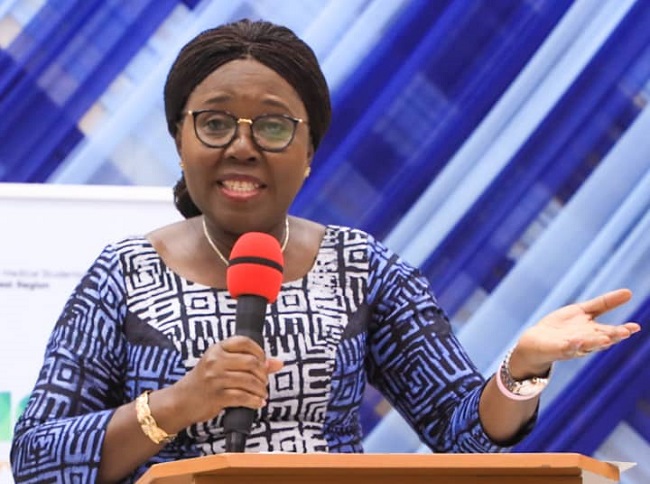Wife of the governor of Ondo State, Chief Betty Anyanwu-Akeredolu, has advised Nigerian medical students to borrow a leaf from their American counterparts by contributing to an improvement in healthcare services through volunteerism in order to curb the prevalence of non-communicable diseases in the country.
The first lady gave the advice at the 8th Regional Convention of the Nigerian Medical Students’ Association (NiMSA), held at the Afe Babalola University Ado-Ekiti (ABUAD)
Akeredolu who spoke on the top ‘Revitalising the Role of Medical Students in the advocacy of Breast Cancer’ as the guest lecturer at the event, decried the high cost of cancer care, and averred that ” volunteering in breast cancer advocacy, conducting Clinical Breast Examination and provision of psychosocial support by NiMSA, would go a long way in early detection, and consequently, reduce cancer burden.”
According to her, “Students in the medical field have been found to be instrumental in a number of public health victories. One study (Shibu, 2021) noted how medical students in the United States of America volunteered as frontline workers when school was closed during the COVID-19 pandemic. It is interesting to note that even when school got back in session, a good number continued to volunteer in their frontline roles because of their “internal motivation and external pressure of strained healthcare environment.”
Mrs Akeredolu, who founded the Breast Cancer Association of Nigeria, (BRECAN) twenty-five years ago, further encouraged the students to be volunteers of some advocacy groups like BRECAN, adding that “You can also provide voluntary service in primary healthcare centres where medical Doctors are lacking.”
She further encouraged the establishment of medical student-run clinic to care for underserved populations and homeless individuals, as witnessed in the USA.
The BRECAN Founder, who revealed the WHO 2020 statistics of 26,000 new cases of breast cancer in Nigeria with about 11,500 deaths yearly, identified late detection, presentation and poor health care services as major causes of the increasing burden of the disease in Nigeria.
She also identified little political will for cancer care, and inadequate radiotherapy centres as other factors contributing to its prevalence and morbidity in Nigeria, compared to countries like Morocco and India who were both referred to as low-middle income countries like Nigeria.
ALSO READ FROM NIGERIAN TRIBUNE
She said: “Although Nigeria has a national cancer plan, it is yet to be implemented and domesticated at the state and local government level. Radiotherapy is an important treatment option for cancer patients yet it is not generally available in Nigeria; whereas Morocco with a population of just about 32 million people has 17 functional radiotherapy centres as of 2014.
“The Federal government is yet to commence any routine-based campaign to raise awareness on any form of cancer. The majority of the awareness creation on cancer are organised by non-governmental organisations working around cancer.”
The guest lecturer called for a holistic approach to breast cancer programming, noting that creating awareness without addressing the issue of patient navigation and quality cancer care services would render awareness almost useless.
“Clearly, reducing the cancer burden requires the effort of an adequate amount of human resource, yet only few personnel and organisations are working in the Nigerian cancer space.
“The job of awareness and patient navigation is pretty much abandoned for NGOs who have very little or no funds to fulfil their mission; while diagnosis and treatment is left for the very few oncologists left in the country who barely have resources to work with,” she said.
She lamented insufficient population-based cancer registries in Nigeria, which, according to her, made it quite impossible to understand the cancer needs in the country.
The governor’s wife expressed concern about the tremendous high-level brain drain in the medical field, and, therefore, emphasised the need to utilise the plethora of medical students to rescue the nation’s health system.
She enjoined the students to develop an interest in the Oncology speciality, stating that it would be difficult to achieve much in the cancer space if the young healthcare providers weren’t interested in cancer care.
“There is a need for the government to create pull-factors for the Oncology speciality by investing more in cancer care infrastructure and incentivizing the speciality,” Mrs Akeredolu added.
EDITORIAL: NPF-PSC’s Endless Clashes
Contribute to healthcare through volunteerism, Akeredolu’s wife tells medical students
This Is Our Last Chance —Tinubu
Contribute to healthcare through volunteerism, Akeredolu’s wife tells medical students
WATCH TOP VIDEOS FROM NIGERIAN TRIBUNE TV
- Let’s Talk About SELF-AWARENESS
- Is Your Confidence Mistaken for Pride? Let’s talk about it
- Is Etiquette About Perfection…Or Just Not Being Rude?
- Top Psychologist Reveal 3 Signs You’re Struggling With Imposter Syndrome
- Do You Pick Up Work-Related Calls at Midnight or Never? Let’s Talk About Boundaries






